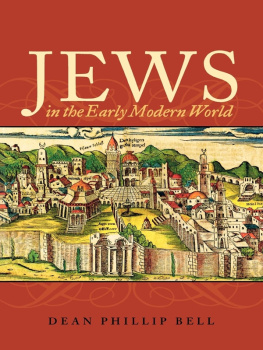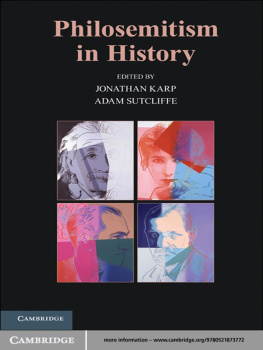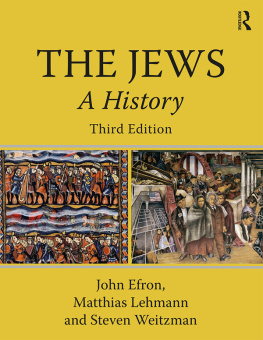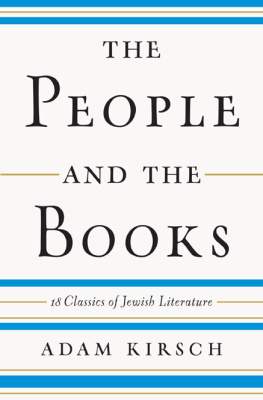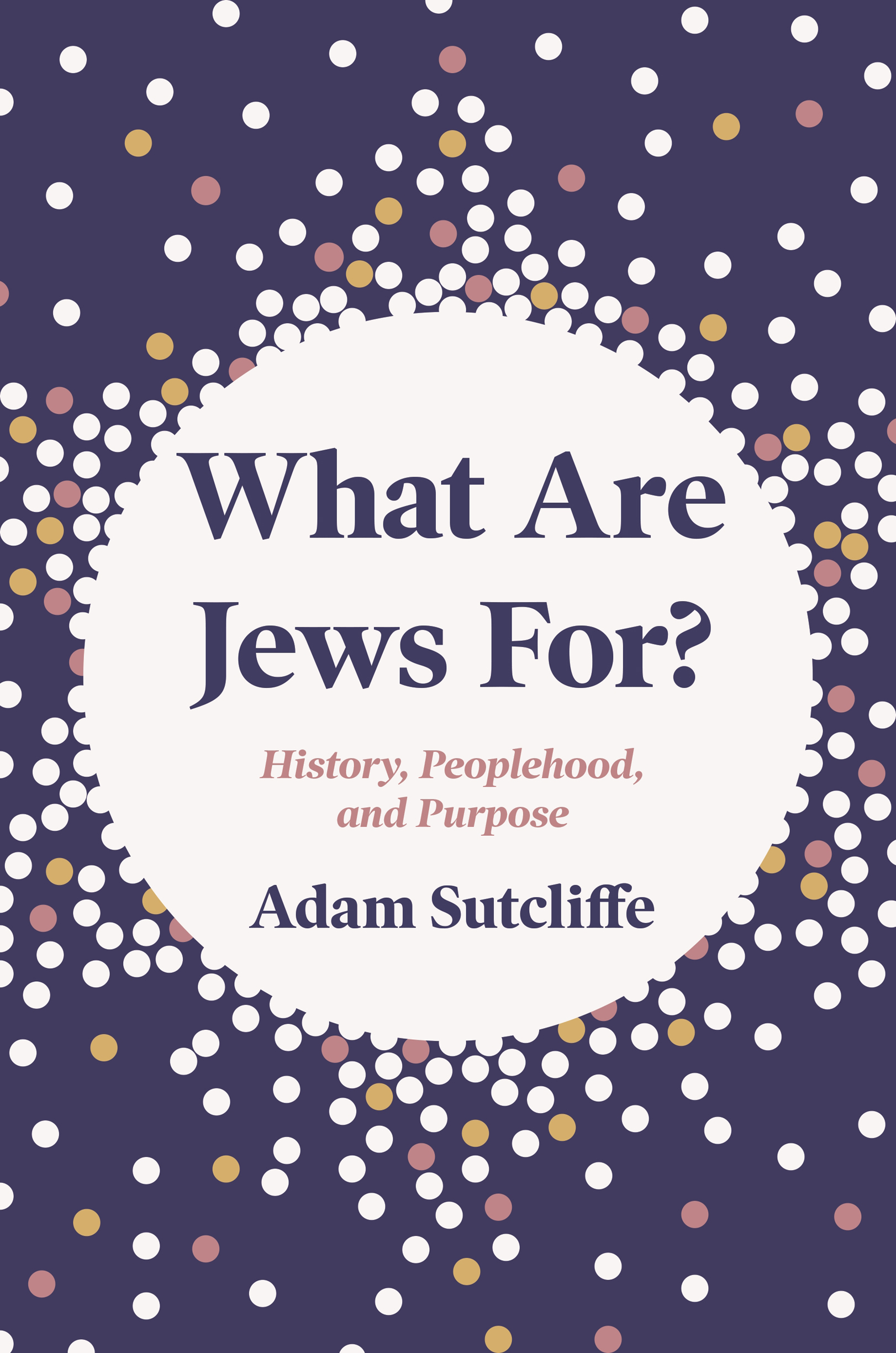Requests for permission to reproduce material from this work should be sent to permissions@press.princeton.edu
Names: Sutcliffe, Adam, author.
Title: What Are Jews For?: History, Peoplehood, and Purpose / Adam Sutcliffe.
Description: Hardcover ed. | Princeton ; Oxford : Princeton University Press, 2020. | Includes index.
Identifiers: LCCN 2019032983 (print) | LCCN 2019032984 (ebook) | ISBN 9780691188805 (hardcover) | ISBN 9780691201931 (epub)
Subjects: LCSH: JewsElection, Doctrine of.
Classification: LCC BM613 .S88 2020 (print) | LCC BM613 (ebook) | DDC 296.3/117dc23
PREFACE AND ACKNOWLEDGEMENTS
THIS BOOK was a very long time in gestation, but once I had found my way to the right formulation of my question it was relatively swift in execution. My question is about purpose, and asking it has itself been for me strongly imbued with a sense of purpose. This isnt only because Jewish purpose is personally important to me: though it is, and the reach and shape of the book inevitably to some extent reflects my own particular vantage point. As much as possible, though, I have attempted to write from an ethnically, religiously, politically and nationally neutral perspective, and to offer all the varied voices I discuss a fair and sensitive hearing.
I here offer what I hope is a scholarly but nonetheless accessible exploration of over four centuries of debate, among both Jews and non-Jews, on what I call the Jewish purpose question. I am an intellectual historian by training and profession, and my primary aim is to explain the historical unfolding of these ideas and arguments, and to capture both their local contextual nuances and their deep continuities and connections across centuries. The concerns of many other disciplinesphilosophy, theology, sociology, literary studies, economics and politicsare also prominent in these pages. My subject, most importantly, is by no means significant only for Jews, or for those who have a special interest in them or their history. Jewish purpose, I centrally argue, is the perennial starting-point in Western thought for reflections on the collective purpose of any and all forms of human group affiliation. This book, in other words, concerns the purpose of all of us.
I have whenever possible used readily accessible editions and reliable published translations of the texts I discuss. In many cases, though, no such translations exist, and quoted translations are my own. Jewish Bible quotations are from the Jewish Publication Society version, and New Testament quotations from the King James version, in both cases occasionally very slightly modified. All web links in the endnotes were functioning shortly before publication.
My debts to those who helped this project take shape are innumerable and immense. Even restricting my thanks to those who have most directly assisted my research and writing, the list is long. My colleagues at Kings College London, particularly but not only in the History Department, have been inspirational, supportive and sustaining in very many ways. I am particularly grateful to Simon Gaunt for his mentorship during my term as Head of Department, and to Evelyn Welch for a turning-point conversation in which she advised me to write the book that I most wanted to write. Several audiences in London, and also in Cambridge, Oxford, Southampton, Cape Town, Illinois and Pennsylvania, helped me test out my arguments: many thanks to Jessica Cooperman, Dara Goldman, Brett Kaplan, Hartley Lachter and Adam Mendelsohn for the international invitations that enabled these encounters. I would also like to thank the many people at Princeton University Press who have worked so assiduously on this manuscript, and in particular my ever-enthusiastic editor Ben Tate, my meticulous copyeditor Francis Eaves and my efficient production editor Debbie Tegarden.
Very special thanks are due to those colleagues and friends who generously found time to read and critique substantial portions of my draft text: Jim Bjork, Hannah Dawson, David Feldman, Shirli Gilbert, Peter Howarth, David Kaskel, Andrea Schatz, Esther Schor and Elliot Wolfson. My triumvirate of rabbinic advisorsJanet Burden, Judith Rosen-Berry and Mark Solomonoffered invaluable encouragement and insights. Brian Klug read the entire manuscript, and offered detailed and extremely shrewd feedback. Jonathan Price provided advice from a publishers perspective. I am extremely grateful for all this assistance, and also to the two anonymous readers on behalf of Princeton University Press.
My most heartfelt thanks, though, are to my family. My brother, William, and my father, John, both read and encouragingly commented on sections of the project. My mother, Susan, read every word, not only picking up my proofreading slips and stylistic clangers, but also helping me disentangle many garbled or over-long sentences. If this book is a clear and pleasurable read for the educated general reader, this is in large measure thanks to her. The wonderful scholarship of my wife, Nadia Valman, is cited thirteen times in my endnotes; engaging closely with it has been one of the special pleasures of this project. This is only the publicly visible tip of the privately submerged immensity of our intellectual, amorous and parental life together. I am boundlessly grateful, as ever, for her loving support, probing critique and constant mental stimulation, during the writing of this book and throughout the past sixteen years.
This book took shape in parallel with asking, together with Nadia, how we might organize a bar mitzvah for our son Orlando that would explore and convey as meaningfully as possible the significance of embracing Jewish adulthood and responsibility. Im not sure to what extent we succeeded, but the attempt to do so richly cross-fertilized with the writing of this book. The challenges and joys of fatherhood over the past fifteen years, the last eleven of them with Lucian also, have been the sustaining centre of my life. If, within the meaner inner recesses of my psyche, theres a part of me that wants to hold my sons, and the delightful distraction they provide, responsible for the errors and infelicities that remain in this book, then I certainly wouldnt have wished it any other way. Perhaps this book will one day help Orlando and Lucian find or clarify their Jewish purpose. They have already, though, helped me find mine.
London
January 2020
INTRODUCTION
What Are Jews For?
HISTORY AND THE PURPOSE QUESTION
We are not obliged to justify our existence by working for the world. Nobody, no other nation, has ever been put under such an obligation, and some of us see it as scandalous that unlike everyone else, we have to justify being Jews by serving some further purpose. No one asks a Frenchman why he is there. Everyone asks a Jew why he is there; no one would be content with the statement, I am just a Jew. Yet the Jew has every right to be just a Jew and to contribute to what he is by being just what he is. We are always asked to be something exceptional, something supreme, something ultimate. Maybe that very expectation will come to fruition one day, and perhaps then even the enigma of being the chosen people, which is not so easily discarded, will be resolved.



